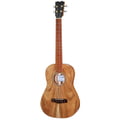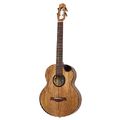Are you ready to dive into the world of ukuleles but unsure which size is right for you? Choosing the perfect ukulele size is crucial for comfort, playability, and achieving the desired sound. With so many options available, from the compact soprano to the robust baritone, finding the right fit can seem overwhelming. Fear not! In this comprehensive comparison guide, we'll explore the differences between ukulele sizes and help you choose the perfect instrument to match your preferences and playing style. Let's get started!
1. Soprano Ukulele
Size: Smallest
Scale Length: Typically around 13 inches
Tuning: G-C-E-A
Sound: Bright and cheerful
Ideal for: Beginners, children, and players with smaller hands
2. Concert Ukulele
Size: Slightly larger than soprano
Scale Length: Approximately 15 inches
Tuning: G-C-E-A
Sound: Balanced and versatile
Ideal for: Players who want a slightly larger body and fuller sound without sacrificing playability
3. Tenor Ukulele
Size: Larger than concert
Scale Length: Around 17 inches
Tuning: G-C-E-A
Sound: Warm and resonant
Ideal for: Intermediate to advanced players, fingerstyle players, and those who prefer a fuller sound with more sustain
4. Baritone Ukulele
Size: Largest
Scale Length: Typically 19 inches or longer
Tuning: D-G-B-E (similar to the top four strings of a guitar)
Sound: Deep and mellow
Ideal for: Guitarists transitioning to ukulele, players who prefer lower-pitched instruments
How to Choose the Right Size:
Consider Your Hand Size: If you have smaller hands, you may find a soprano or concert ukulele more comfortable to play. Larger hands may prefer the extra space offered by a tenor or baritone.
Think About Sound Preference: Different ukulele sizes produce different tones. If you prefer a brighter sound, a soprano or concert ukulele may be ideal. For a warmer, fuller sound, consider a tenor or baritone.
Try Before You Buy: Whenever possible, try out different ukulele sizes before making a purchase. Visit a local music store and test-play various models to see which size feels most comfortable and sounds best to you.
Consider Your Playing Style: Are you primarily strumming chords, or do you enjoy intricate fingerpicking? Your playing style may influence which ukulele size is best suited to your needs.
Conclusion:
Choosing the right ukulele size is a personal decision that depends on factors such as hand size, sound preference, and playing style. Whether you opt for the compact soprano, versatile concert, resonant tenor, or deep-toned baritone, each ukulele size offers its own unique characteristics and advantages. By considering your preferences and testing out different sizes, you can find the perfect ukulele to accompany you on your musical journey.


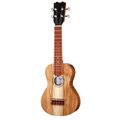
 Thomann Soprano Ukulele Standard
Thomann Soprano Ukulele Standard
 Harley Benton Ukulele DIY-Kit Sopran
Harley Benton Ukulele DIY-Kit Sopran
 Cascha Premium Soprano Uku Solid Top
Cascha Premium Soprano Uku Solid Top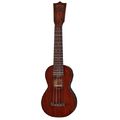
 Martin Guitars 0 Soprano Ukulele
Martin Guitars 0 Soprano Ukulele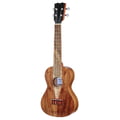


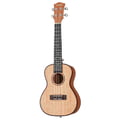
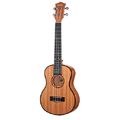


 Flight Victoria CEQ-A Tenor
Flight Victoria CEQ-A Tenor
 Kala KA-SMH-TG-CE Tenor Ukulele
Kala KA-SMH-TG-CE Tenor Ukulele